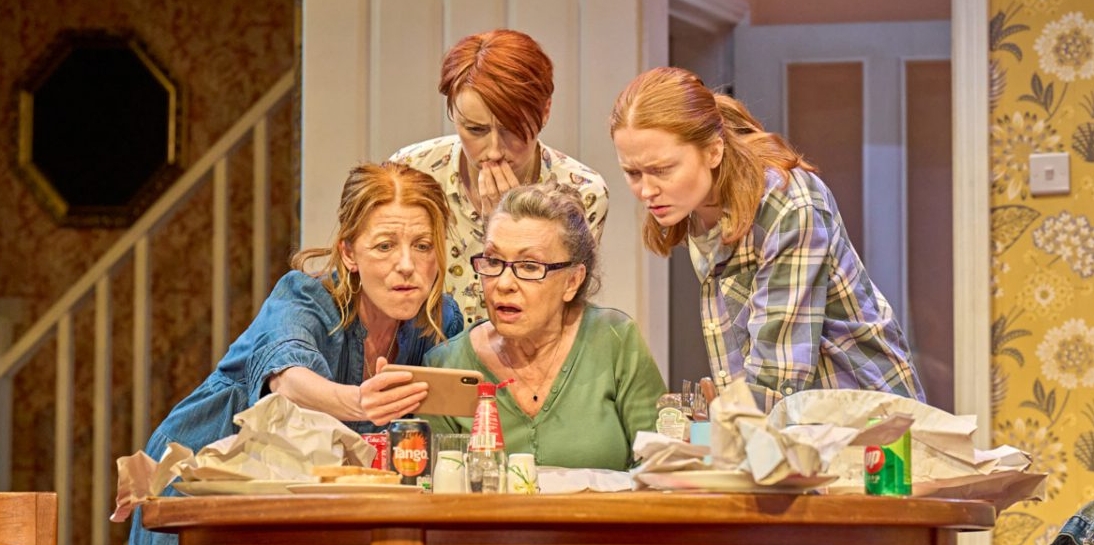Cuckoo is a play where nothing happens, thrice. Unlike Waiting for Godot, Michael Wynne’s three-act play is not ethereal and timeless, but fixed in a specific time and place. It is emphatically Birkenhead (not Liverpool) and it is now. The dress, the social mores, the technology, and the dialogue all lock the action in a single moment in time, like Abigail’s Party. This is the world, not of Demis Roussos and nibbles, but of Vinted, DMs, catfishing and fake news. But what is this play about?
The opening scenes are conducted almost entirely with grunts, smiles, and a flurry of online sales, shares, likes, and tweets as four women sit around a kitchen table glued to their phones. Over fish and chips from ‘the one down the bottom’, we are introduced to Doreen the widowed matriarch played by Sue Jenkins, and her grown-up daughters Sarah and Carmel played by Jodie McNee and Michelle Butterly. Both actors display marvellous sororal rivalry.
Sarah is a teacher in a primary school led by the environmentally-conscious Felicity Barker-White (who we never see but appears to be one of the most fascinating characters). Carmel works in Boots in the Pyramid Centre on a zero-hours contract. She struggles with money, takes in ironing, and borrows cash from her mum, as her ‘flexible’ hours dwindle to the point of penury.
The eponymous character is Megyn, the daughter of Carmel, played by Emma Harrison – the cuckoo in the nest, a workless, friendless, hopeless teenager. Megyn withdraws from the ‘real’ world, ejects her grandmother from her bedroom, and takes up permanent residence. She emerges only to use the toilet, and to collect the cheese butties, crisps and squash left by the bedroom door.
All three acts take place around the kitchen table, with only the four women appearing. The men are absent – Doreen’s husband is dead, Megyn’s father has done a runner, and Sarah’s boyfriend Simon the Dentist turns out to be a fraud who skedaddles and ghosts her. The only positive male is Barry, who Doreen is secretly dating, and who brings her joy and self-expression after 40 years of a controlling husband who banned everything from his wife working to coleslaw.
The dialogue is whip-smart. Michael Wynne captures the language of these working-class women from his Birkenhead home in all its glorious banality and profundity. Unlike sitcom attempts at ‘doing Liverpool’ such as the dreadful Bread, there are no generic scouse accents but instead a nuanced and subtle understanding of the rhythms and cadences of this particular part of Merseyside.
Jodie Mcnee in particular stands out in this regard, with drawn-out syllables at the end of her sentences exactly matching local speech-patterns. There are funny moments, but I am not sure the humour is as side-splitting as most of the audience thought it was. I was left a little unsure why so many people were laughing like drains, but they were.
The issue that audiences must confront is the one posed at the start of this review – what is this play about? Some critics, for example, have found it ‘baffling’. There are big swirling themes addressed over the chippy tea and cans of Tango: the climate crisis, rape, the dehumanising effects of technology, the gig economy, terrorism, and the class divide.
But the main theme is mental illness. Megyn is experiencing a severe mental health episode, with her depression and agoraphobia exacerbated by social media and a mother unable to cope. This is the double-meaning of ‘cuckoo’ – not just an invasive guest but also mental instability. There are references to mental health peppering the script.
What happens in Cuckoo is that a girl is made mentally-ill by the two great revolutions of our time: the climate crisis and the ubiquity of technology and its perversion of what is real and what is fake. Megyn is not just a confused and frightened 17-year-old: she is all of us, bewildered, anxious, blinking at the sunshine. Michael Wynne has written a brave, thoughtful, and well-observed play, possibly ahead of its time. I think it will grow on audiences as it has on me.

